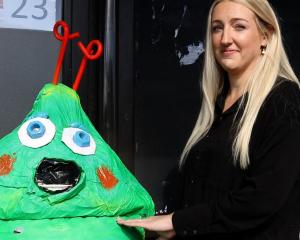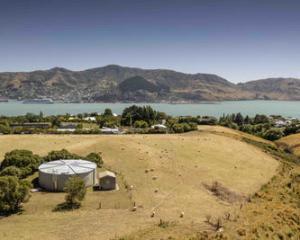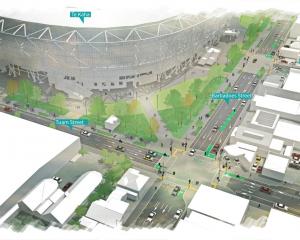
Alastair Taylor lights a candle for his wife every night.
He is determined to make sure his children remember her - particularly his youngest who was just a baby when Kristin Taylor took her own life after a harrowing struggle with her mental health.
Coroner Peter Ryan has released his findings into Kristin's death in August 2020, confirming she committed suicide while in the depths of depression and anxiety.
Alastair spoke to the Herald about her death, hoping he can help others and even save lives by creating much-needed awareness around perinatal anxiety and depression.
"Kristin dreamed of being a mother and was so excited when we found out she was pregnant. She mostly loved being a mum… until the anxiety returned," said Alastair.
"My two older kids, who are now 18 and 16 adored her. She was the "big sister" type of step-mum and we have many happy memories which we talk about often.
"Our wee girl knows that her Mumma died and that Mumma died because she got very ill. We talk about Mumma often and she knows that her Mumma loved her very, very much.
"We love her and miss her every day."
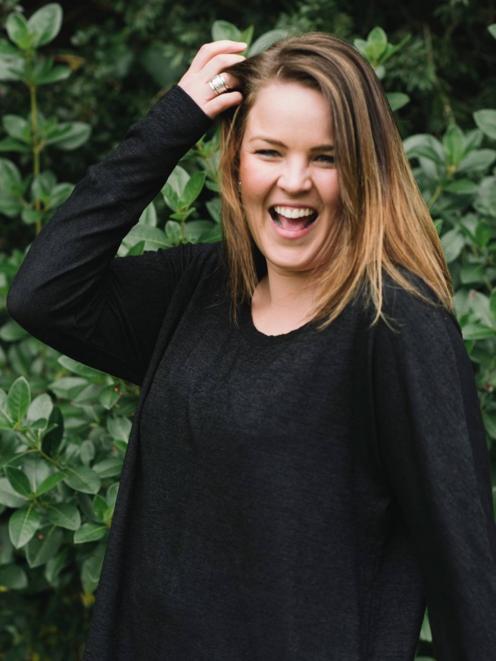
That morning - and the entire day before - she had stayed in bed, saying she was feeling bad.
Alastair had been checking in on her regularly and left her to rest for a short time.
It was about 10.40am when he went to have a shower and found her critically injured.
Alastair called 111 and under the instructions of the call taker, started CPR on his wife.
Two of the children - the baby and her then-14-year-old sister, were in the house at the time.
Paramedics soon arrived and Kristin was rushed to Wellington Hospital.
Four days later her life support system was turned off and she died
"Initially hopes were high that she would survive, but that evening her head started 'fitting' and so when the call came the next morning to come in urgently, there was little surprise at the news that she would never recover.
"It was utterly devastating news. I broke down and wept for probably an hour.
"Kris was an incredible person, and I couldn't believe we were going to lose her… When I look back now on the weekend when Kris did the damage to herself which left her in a position where we had no choice but to let her go."
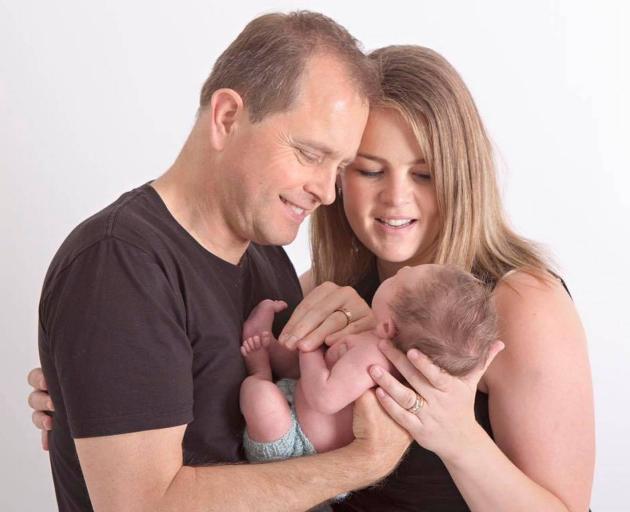
"That was the worst day of my life," he recalled.
"Waiting for the team to be ready for us to say goodbye to Kris. The last time her skin and lips would be warm. I held her hand and talked to her for the two minutes it took for her to pass away once the machines were removed.
"Her dad and my son were also with us and once all was silent the tears flowed."
Kristin had suffered from anxiety since her childhood in Southland and had been taking antidepressants for around 20 years.
But when her daughter Greer was born in October 2018 a new diagnosis of "generalised anxiety disorder with depressive elements" was established.
Greer's birth was "very traumatic" and when Kristin's anxiety increased she was referred to the Maternal Mental Health Service.
In August 2019 Kristin tried to take her life using a number of methods and was admitted as an acute mental health inpatient.
Later that month, while on leave from the facility with her husband, she tried to take her life again.
Over the last few months of 2019 and the first few months of 2020 Kristin engaged in several serious self-harm incidents.
She was admitted on two occasions as an inpatient to the mental health unit, and finally discharged on 19 June 2020.
From then until a few days before she died Kristin seemed to be doing okay.
But then she began speaking frequently about finding ways to kill herself.
Alastair, naturally worried, had removed all obvious options from the house in a bid to stop her.
But he could not.
Nothing anyone did could help to lift the darkness that took over her mind and her life.
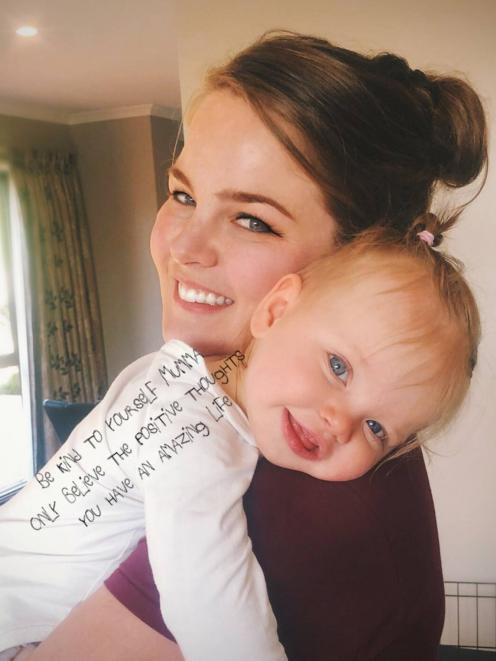
"She had suffered with anxiety since she was 13. After eight years of being bout-free, it reignited with a vengeance in the months after our little girl was born.
"Kristin's anxiety manifested as an almost obsessive 'need' to kill herself. She survived eight attempts over a twelve-month period, before eventually being successful, despite our very best efforts to keep her safe.
"Towards the end it became clear that her mental wellness was very closely linked to her menstrual cycle, with her being well one week a month, struggling but okay two weeks and one week where she really struggled.
"We tried to get all the support possible – using the local mental health team, a private psychologist and a private naturopath all to no avail."
Coroner Peter Ryan outlined Kristin's mental health history in his findings, released to the Herald.
He said during an in-patient admission in March 2020 she was diagnosed with treatment-refractory generalised anxiety disorder, adjustment disorder with anxiety and depression, and complex post-traumatic stress disorder.
She was under the care of Kāpiti Mental Health and had regular contact with specialists including a psychiatrist and psychotherapist.
But in June she started to struggle again both with anxiety and suicidal thoughts.
She was admitted again as an acute patient for eight days.
On July 15 Kristin had deteriorated and was reviewed by another psychiatrist.
She asked to be admitted to hospital on a voluntary basis and Alastair agreed that was the appropriate course of action.
But, there were no beds available.
Kristin was offered a stay in respite care instead but declined.
The psychiatrist raised the possibility of treatment under the Mental Health Act - effectively meaning Kristin would be assessed and treated under a compulsory order.
Alastair was firmly against this and the couple left the appointment.
He and Kristin told the KCMHT team numerous times before she died that they did not feel properly supported and that she was not getting the treatment she needed.
At a meeting between the couple and clinicians on August 20 Kristin "acknowledged she continued to struggle with anxiety, depressed mood, distress tolerance and suicidal ideation".
She also acknowledged she had made progress in that "there were some improvements in her experience of symptoms and her ability to manage anxiety, and her capacity to engage in psychological therapy had improved".
It was agreed she would have weekly support from a psychiatrist and an appointment was made for September 1.
But Kristin died before that appointment could take place.
Coroner Ryan said Kristin had "a number of complex psychiatric conditions which proved very difficult to treat".
She had tried to take her life before and had indicated she was thinking about it again - a lot - before she died.
"The actions taken and the effort required which resulted in the death show a significant level of deliberateness and premeditation," the Coroner ruled.
He said Kristin had engaged with mental health services and received "a great deal of support".
But it simply was not enough to help the troubled mother.
"It appears that Mrs Taylor did not give any indication of her intention at the time to anybody," said Coroner Ryan.
"Consequently there was no opportunity for urgent and immediate intervention which may have prevented her death.
"Mrs Taylor did not share her reasons for ending her life by leaving a note explaining her actions - but the psychiatrist's report indicates that she clearly felt that she could not go on with her life."
After Kristin died a Serious Event Review was undertaken by the Mental Health, Addictions and Intellectual Disability Service of the District Health Boards to review her care in 2020 and "identify any learnings… and any necessary changes to systems or processes".
Coroner Ryan said the review found "no clear care delivery problems in relation to the incident" which ended in Kristin's death.
"Specifically, on balance, there were no actions or omissions where care deviated beyond safe limits of practice," he said.
"There was a nuanced appreciation of Mrs Taylor's formulation, including that she was at chronically increased risk of suicide and this risk was difficult to completely mitigate.
"The available materials did not clearly prospectively indicate a significant change in Mrs Taylor's acute suicide risk necessitating an escalation in her care immediately before [her death]."
While Coroner Ryan ruled Kristin's "serious" mental health condition was the predominant factor contributing to her death, he said the SER did identify factors that provided "scope for reflection and learning" by MHAIDS.
Those mainly related to the "provision of respite accommodation, consideration of the role of other persons directly involved in Mrs Taylor's care, and communication with family".
"The SER report contains five recommendations but given that the review found there was no deviation from the required standard of care, those recommendations are not targeted at failings in the care provided to Mrs Taylor," he said.
Alastair said after Kristin died he was "numb, scared, lonely, devastated, utterly grief-stricken".
"The mechanics of organising a funeral at the other end of the country while in Level 2 were challenging and distracting," he said.
"We had a non-religious service for Kris, with a plain pine casket which allowed friends and family to send her on her way with messages on her coffin.
"I hated lowering her into the ground and saying goodbye."
He said looking back at her death he could see they were "both utterly broken".
"We were both exhausted, her from her illness, me from being her partner and carer, looking after our little one and holding down a fulltime job and of course, we had the restrictions and extra stress of Covid which made it impossible for the family to provide additional help," he said.
Alastair hoped Coroner Ryan's report would be taken seriously by mental health providers.
"I hope that those lessons will not be lost in the bureaucracy, but will do a little to improve the care of other patients," he said.
"I hope the inquest finding and things like my openness to discuss what has happened will continue to remove the stigma which still exists around discussing mental health and especially peri-natal mental health.
"Everyone seems to know someone who has suffered with 'the baby blues' or more with the birth of their child.
"So much of our mental health care system seems to rely on 'care in the community when in actual fact, we have to recognise that most of us no longer live in communities. We live in our bubbles – often geographically separated from close friends and family.
"I think it is becoming slightly easier for people to ask for help – but that help has to come from our broader community – especially with the current chaos which seems to beset our entire health system."
Alastair said he had "great sympathy" for the mental health professionals who treated his wife and had no doubt they were "trying to do their best".
"The simple reality though is that the system is not currently up to the job.
"I regret that the professionals didn't identify how ill Kristin was and how exhausted I was in the week leading up to Kristin's death. Kris needed to be placed into a safe environment, for those days of the month where she was most at danger from herself.
"It pains me to think how easy it was for ACC to spend the money to help with Kristin's physical recovery from her unsuccessful suicide attempts, while the mental health system struggled to provide adequate care.
"I'd suggest we have our priorities wrong when that is the case."
He urged people struggling with any mental health issue to speak up - to not feel ashamed or less than, to simply ask for help.
He also called on authorities to prioritise mental health care - in strategy, resourcing and funding.
Ultimately he wanted to reduce the stigma around perinatal mental health issues and was pushing for New Zealand to provide more support for mothers, families and their healthcare workers.
His advice to other parents, couples, Kiwis battling?
"Tell everyone – I know it's hard – but ask for, plead for, demand help," he said.
"From the professionals, from your family, from your friends.
"It frustrated me enormously that I got more help from different organisations once Kristin was dead, than I could access while she was alive and needed support.
"Talk to your GP and ask for help. Contact Perinatal Anxiety and Depression Aotearoa, contact the Mental Health Foundation, contact Mentemia. Tell them your situation and ask for help.
"If you're a carer and you are overwhelmed – tell them.
"If you don't think you are – ask them for an assessment. I know I didn't realise I was broken until it was too late."
Alastair is currently in the UK with his three children spending time with family and friends - some who are meeting little Greer for the first time.
"Something like this changes you and has made all of us appreciate life more. We all miss Kris every day, and she is a big gap on this trip," he said.
"Outside of this trip, Greer and I have moved from Kāpiti to Canterbury to an area where we have a bigger support network and are that bit closer to Kristin's family in Southland."
He is determined to raise his family how he and Kristin planned - "encouraging and coaching them to be their own people… to be curious and explore life".
And every day he makes sure his kids know what a special woman Kristin was.
"She brought out the very best in others. She was incredibly empathetic, warm, loving and irreverent," he remembered.
"Kristin made me a better person – much more aware of and able to communicate my emotions, something which tragically has stood me in good stead for helping her with her illness and surviving once we lost her. I miss her every day.
"I remember Kris as I spoke to her in our wedding vows: 'You are my best friend, my mentor, my playmate, confidant and my greatest challenge. You make me happier than I could ever imagine and you have made me a far better person. I will dream with you, communicate fully and walk beside you through whatever our lives may bring."
WHAT IS PERINATAL DEPRESSION?
Everyone's experience of parenthood is different. Just as there are physical changes, there are also common shifts in emotion after you give birth such as mood swings, anxiety and
excitement.
Becoming a parent can be a wonderful experience, but it also brings many changes and challenges.
Everybody feels down from time to time but a depressive illness is more than that. It is when several symptoms occur over the same time period.
Postnatal depression (PND) is very similar to clinical depression occurring at any other time of life except that there is the added complication of a baby.
PND can range from mild to severe. At its most mild it is not dangerous and generally gets better with good emotional and practical support, sleep and time.
But, at its most serious it can be life-threatening and can pose a risk to yourself, your baby and your family.
If you feel scared or overwhelmed it is important to know that help is available - many other mums and dads struggle with anxiety and depression when a new baby arrives.
You are not the only one that feels this way - and there is absolutely no need to suffer alone, so talk to your midwife, doctor or other health carer.
No one expects you to be superwoman, so put down your mask and reach out for support.
(SOURCE: Perinatal Anxiety & Depression Aotearoa)
RECOGNISING THE SIGNS
You might be suffering from postnatal anxiety or depression if you have any of these symptoms. Do any of these things affect you?
• Panic attacks
• Persistent worry, often focused on fears for you or your baby's health
• Developing obsessive or compulsive behaviours
• Experiencing abrupt mood swings
• Feeling constantly sad, low, or crying for no obvious reason
• Being nervous, 'on edge', or panicky
• Feeling constantly tired and lacking energy
• Having little or no interest in all the usual things that bring you joy
• Sleeping too much or not sleeping very well
• Feeling overwhelmed or numb
• Losing interest in sex and intimacy
• Withdrawing from your partner, friends and family/whānau
• Being easily annoyed or irritated, or feeling angry
• Finding it difficult to focus, concentrate or remember
• Engaging in more risk taking behaviour like using alcohol or drugs
• Having thoughts of death or suicide
It is vital to seek support and treatment for the way you are feeling as soon as possible.
If you need to seek help quickly. If you are suicidal or feeling disoriented and unable to handle daily life, or are having panic attacks, contact your doctor or midwife immediately.
Dial 111 if you need urgent help.
You are doing the right thing. You and your family/whānau should be reassured that seeing a therapist or psychiatrist is not a sign of weakness. It's a sign that you are taking important steps to keep yourself and your baby safe and healthy.
(SOURCE: Perinatal Anxiety & Depression Aotearoa)
MENTAL HEALTH - WHERE TO GET HELP
If it is an emergency and you or someone else is at risk, call 111.
For information and support
Perinatal Anxiety & Depression Aotearoa
Lifeline: Call 0800 543 354 or text 4357 (HELP)
Suicide Crisis Helpline: Call 0508 828 865 (0508 TAUTOKO)
Need to talk? Call or text 1737
Depression helpline: Call 0800 111 757 or text 4202
For children and young people
Youthline: Call 0800 376 633 or text 234
What's Up: Call 0800 942 8787 (11am to 11pm) or webchat (11am to 10.30pm)
The Lowdown: Text 5626 or webchat
For help with specific issues
Alcohol and Drug Helpline: Call 0800 787 797
Anxiety Helpline: Call 0800 269 4389 (0800 ANXIETY)
OutLine: Call 0800 688 5463 (0800 OUTLINE) (6pm-9pm)
Safe to talk (sexual harm): Call 0800 044 334 or text 4334
All services are free and available 24/7 unless otherwise specified.
For more information and support, talk to your local doctor, hauora, community mental health team, or counselling service. The Mental Health Foundation has more helplines and service contacts on its website.
-By Anna Leask




